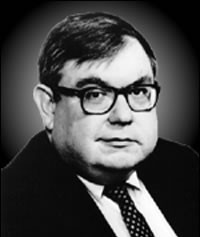 Samuel T. Francis
Samuel T. Francis
Championing
Western Civilization
and the great legacies of
Sam Francis and Joe Sobran
and their allies
 Joseph Sobran
Joseph Sobran
FGF E-Package Progress, Progressives, and Perversion “I Am Who Am” (Exodus 3:14) FRONT ROYAL, VA — Last week’s Rubble examined change. Heraclitus feared it and longed for the unchanging logos. Only with the Incarnation did the logos get a name: Jesus Christ, the Alpha and the Omega, “first, last, and always.” In contrast to Christian philosophy, the heady hedonism of the modern power dialectic glorifies constant change because, where God is denied, “everything is permitted,” as Smerdyakov puts it in The Brothers Karamazov. We then explored how the dialectic leads directly to tyranny. Then what kind of “change” can we believe in? Since Confucius, we’ve known that words must be used in their proper meaning. But the Left is forced by reality constantly to pervert definitions. Remember Syme, the poor sap in the Ministry of Truth? He had to change Big Brother’s NewSpeak Dictionary by eliminating most of the English language. His mistake? He was honest about it. Zap! — he was DoublePlusDead! The Left has learned their lesson: they’re not honest about it. Where have all the liberals gone? Why, they’re all “progressives” now. The term “liberal” became so unpopular that they shoved it out to the curb, without so much as a proper burial. But wait — how can we oppose progress? Well, it depends on where we’re headed. In Christendom (R.I.P.), “progress” reflected Salvation History. Saved from sin and death by the Lord of History, humanity progresses towards the Last Judgment and the Four Last Things, while each individual soul is called to Christian perfection: reform — true progress. The post-Christian age begs to differ. Emancipated from the burden of faith, “History” has acquired a life of its own, and drags us (yes, to Marx it is inexorable) towards a perfect future, not beyond time but within it — heaven on earth, presided over by the most progressive among us, of course. And what determines that status? Lenin has the answer: Power. After all, without God, “everything is permitted.” Marx blatantly adopted Augustine’s view of history, but cut off the supernatural above it and beyond it. He did the same with human nature. Power is all that’s left. Whoever wields it is the supreme being — at least for the moment (“change happens”). The two views of progress prevailing today — the Christian and the materialist — are answers to the timeless questions encompassed in the title of a very provocative book by professors Charles Rice and Theresa Farnan: Where did I come from? Where am I going? How do I get there? Both Christians and Progressives have concrete answers to these questions. Curiously, while they are framed in the same vocabulary, they are profoundly contradictory. The contradiction focuses on change. Here the watchword is “reform.” To both worldviews, reform and progress are powerful concepts. The Christian sees in them a transcendent invitation, inspiration, challenge, and gift. The materialist Left empties the terms of all spiritual content, and sanctifies the husk that’s left: all must bow before the modern gods of progress and reform, emptied of everything but power. Every thinking person must confront the problem of evil and account for it. Both the materialist and the Christian acknowledge evil but differ on its origins. The Christian cries in anguish, with Saint Paul: “For I do not that good which I will; but the evil which I hate, that I do.” (Romans 7:15). The will weakened by Original Sin is the source of evil, and the remedy, won by Christ’s Cross and Resurrection, is metanoia — reform: “It is now the hour for us to rise from sleep. For now our salvation is nearer than when we believed. The night is passed, and the day is at hand. Let us therefore cast off the works of darkness, and put on the armour of light. Let us walk honestly, as in the day: not in rioting and drunkenness, not in chambering and impurities, not in contention and envy: But put ye on the Lord Jesus Christ, and make not provision for the flesh in its concupiscences.” (Romans 13: 11-13) The progressive chokes on that. His life purpose is to indulge his passions and appetites, not to subject them to some logos whose existence he denies. For him, the source of evil is not the human heart or our fallen nature, but structures that cannot be altered by free will (which doesn’t exist either). This attractive prospect tempted Augustine, in his Manichaean days, and even tempted the U.S. Bishops Conference when, in 1979, it issued a pastoral letter condemning “an unresolved racism that permeates our society's structures and resides in the hearts of many among the [racial] majority.” Wow — does that mean that white folks should crowd the Confessionals? Not at all. Yes, it’s a guilt trip, but nobody is really to blame: it is “the structures of our society [that] are subtly racist,” the bishops write. “They are geared to the success of the majority and the failure of the minority. Members of both groups give unwitting [emphasis added] approval by accepting things as they are.” Everybody is a racist, but this peculiar brand of racism is so subtle and so deep that we don’t even know it’s there. Our old friend Karl Marx also saw subtle and deep causes that the rest of us didn’t see. While Saint Paul detects evil in the struggle within the soul; Marx ascribes evil to the class struggle, which is perpetuated by material structures — in our day, capitalism. He does not observe that its mindless participants, the bourgeoisie and the proletariat, “accept things as they are” — in fact, the bourgeoisie is trapped by its bourgeois consciousness; bourgeois man has no free will, so he couldn’t repent and reform himself or reform structures anyway. Only the party member — who has read and embraced Marx — has “had his consciousness raised,” as the saying goes today. For the rest of us, history careens onward uncontrollably to the worst conflagration in history — the Dictatorship of the Proletariat. And all the while, “everything is permitted.” (By the way, according to Marx, the class struggle began with the sex act, a “division of labor” that introduced alienation into history for the first time. If you’ve ever wondered why feminists fulminate with hatred for “patriarchy,” well, start there.) Was Marx a progressive? You bet. The past is evil, the future is good, and you can get there by — following Marx! Like Lenin did? Well, not quite: Marx promised that “the state will wither away,” but Lenin knew better: "the dictatorship of the proletariat is the rule — unrestricted by law and based on force — of the proletariat over the bourgeoisie," he wrote in 1917. And who shall rule? The “vanguard of the proletariat” — the Communist Party. Lenin’s plasticized carcass has been preserved on Red Square, and his spirit (well, Leninism) lives on as well. In 1987, Mikael Gorbachev explained reform — perestroika — in strikingly familiar terms. “Perestroika means the elimination from society of the distortions of socialist ethics, the consistent implementation of the principles of social justice,” he wrote. “The essence of perestroika lies in the fact that it unites socialism with democracy and revives the Leninist concept of socialist construction both in theory and in practice. The goal is worth the effort. And we are sure that our effort will be a worthy contribution to humanity's social progress.” Social Justice. Humanity. Progress. Ethics. Democracy. “Words, words, words, I’m so sick of words,” sang Liza Doolittle. But Confucius was right. To restore order in a collapsed society, the first priority is to restore the proper meaning of words. And the first priority of the Left is to pervert the Christian vocabulary of virtue and freedom and subject it to the lust for power. <For the Christian, reform means turning to Christ. For the Left, it means returning to Lenin. From Under the Rubble archives From Under the Rubble is copyright @ 2025 by Christopher Manion. All rights reserved. Christopher Manion, Ph.D., served as a staff director on the Senate Foreign Relations Committee for many years. He has taught in the departments of politics, religion, and international relations at Boston University, the Catholic University of America, and Christendom College, and is the director of the Campaign for Humanae Vitae, a project of the Bellarmine Forum. He is a Knight of Malta. This column is distributed by Griffin Internet Syndicate and FGF Books, www.fgfBooks.com. See a complete biographical sketch. To subscribe or donate to the FGF E-Package online |